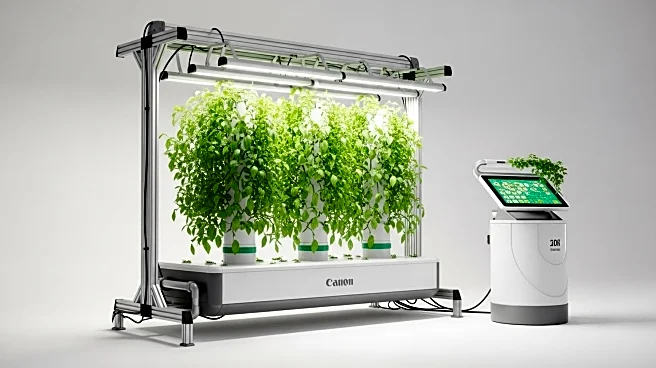What's Happening?
The global Aeroponics Farming Market is experiencing significant growth as sustainable agricultural practices gain traction worldwide. Aeroponics, a method of growing plants in a nutrient-rich mist without soil, is being increasingly adopted as a forward-thinking farming solution. This technique is particularly appealing due to its ability to use up to 90% less water and eliminate the need for harmful pesticides, making it ideal for urban and vertical farming. The market is driven by concerns over food security, climate change, and water scarcity. North America currently leads the market due to its advanced agri-tech infrastructure, while Asia-Pacific is expected to see the fastest growth, fueled by rising food demand in countries like India and China.
Why It's Important?
The expansion of the aeroponics farming market is crucial as it addresses several pressing global challenges, including water scarcity and the need for sustainable food production. As the global population is projected to reach nearly 10 billion by 2050, sustainable farming solutions like aeroponics are essential to meet the increasing food demand. The method's efficiency in water use and its ability to produce chemical-free food make it a vital component of future agricultural practices. Additionally, government support through subsidies and policies promoting sustainable agriculture further propels the market's growth, offering economic opportunities for farmers and agri-tech companies.
What's Next?
The future of aeroponics looks promising with advancements in automation, renewable energy-powered farms, and AI-driven crop monitoring expected to enhance scalability. As technology costs decrease and awareness increases, the barriers of high initial investment and the need for skilled labor are likely to diminish. The industry is poised to play a significant role in urban food security and reduce dependency on imported crops, particularly in regions with limited arable land and water resources.
Beyond the Headlines
Aeroponics farming not only offers environmental benefits but also presents economic opportunities by reducing operational costs and increasing productivity through technological innovations. The integration of AI, robotics, and smart sensors is set to transform the agricultural landscape, making aeroponics a key player in the global food supply chain. As consumer preference shifts towards fresh, pesticide-free produce, aeroponics could significantly impact food production and distribution models.











